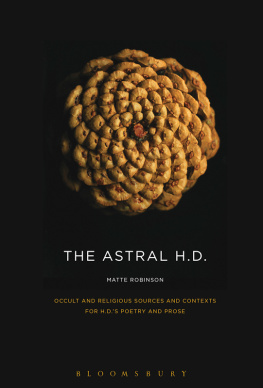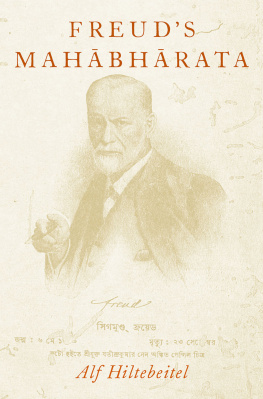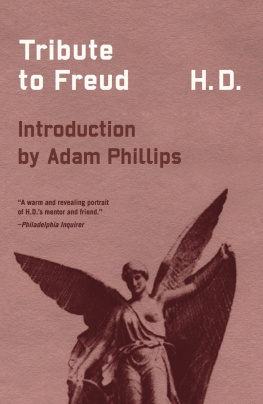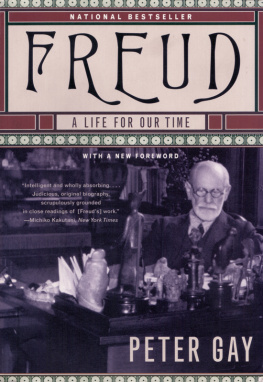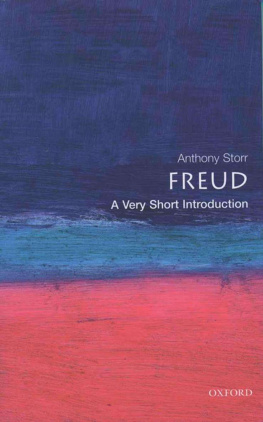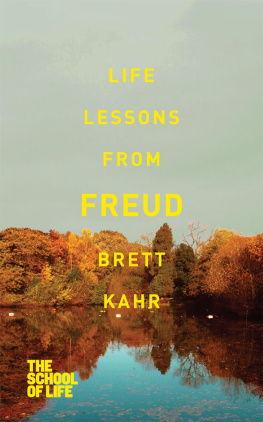The Astral H.D.
Unpublished works of H.D.:
Copyright 2016 by The Schaffner Family Foundation.
Used by permission.
The Astral H.D.
Occult and Religious Sources and
Contexts for H.D.s Poetry and Prose
Matte Robinson
Bloomsbury Academic
An imprint of Bloomsbury Publishing Inc

This book is dedicated to Demetres Tryphonopoulos,
Il Miglior Fabbro; to Cora Woolsey, my Large Star;
and to Tigh Robinson-Woolsey, my little Aquarian.
The goal of this book is to enhance readings of H.D.s late long poems and to ground analyses of H.D.s literary engagement with the spiritual, the esoteric, the occult in texts that were important to her in her later writing, with a particular focus on the last decade of her career. I use the qualifier literary not in an attempt to insulate the discussion against the intrusion of biographical elements, nor to claim speciously that H.D. was only drawn to the occult because of its poetic possibilities. With any writer such claims are suspect because they hint at ideological positions that do not need to be taken: that occultism is a sign of a deranged mind, or a lazy thinker, or an antisecularist, or an elitist. With H.D. making such claims would be of little value. It is also not possible to limit the discussion to H.D.s literary engagement with the occult to any one kind of writing: its influences are found in work that spans from fiction to poetry, creative nonfiction, memoir, journal, correspondence, and a number of hybrid genres; because of Norman Holmes Pearsons unique position relative to her late work, there is also no clear demarcation between her private and public writings. It is well known that H.D.s search for understanding and mental health through psychoanalysis informed her work, and it has long been known that the occult was another tool in that endeavour, one that became increasingly important in her later life. But compared to her appropriation of Freud and psychoanalysis, about which volumes have been written, little is known about the way H.D. used the occult in her literary work. Even seasoned readers of H.D. can be baffled by sections of her later work because of this occultism, a circumstance that can distort readings or turn critical attention to other, more accessible works.
This book is meant to help readers struggling with those difficult sections of H.D.s work and to assist scholars who use H.D.s work to discuss broader topics by grounding and limiting discussions about H.D.s occultism using archival evidence. Occultism has always been open-source: individuals or groups take Theosophy and works derived from the Theosophical Society present similar problems, as does the general body of spiritualist literature. Because the occult is so syncretistic, there are always parallelssometimes striking oneswhich often turn out to have a distant common origin but no direct connection.
Blavatsky and Theosophy, Eliphas Levi, Plotinus, the Hermetic Order of the Golden Dawn, Carl Jung, the Nag Hammadi Library, the modern revival of alchemyall can be applied, in a broad sense, to H.D., and many of them have been. Studies that cover wide trends and only feature a chapter (or less) on H.D. can be forgiven for seeing her as an alchemist or a gnostic because of the parallels in her work to the tradition or her use of imagery from one or more of those traditions, but the question of how such information was slanted as she encountered it remains largely unasked. Such a strategy can produce a decent book on a Gnostic revival or on the Hermetic tradition, but the approach can tend to treat modern authors as though they lived in the third century, or the sixteenth: reincarnation as a means of accessing hidden knowledge is an idea H.D. explored, but her critics should not. Jorge Luis Borges Pierre Menard opted to write Don Quixote as a thoroughly modern man because reproducing the internal conditions of a writer living in Cervantes historical milieu would be too easy, an empty historical reproduction. Similarly, H.D. wrote her arcane occult texts not as a soul living in the wrong century, but as one of the voices that defined modernism.
This book aims to show where H.D. found her Gnosticism, Hermeticism, and Rosicrucianism and to specify which contemporary traditions they were filtered through. Then the next book on broader trends can be precise, and critics can know a little bit better to what degree H.D. was subverting the tradition compared to how much it was already subverted as she encountered it. Also, readers of difficult sections of the late work will, I hope, have much less guesswork to do when trying to figure them out. To an outsider, all occult systems seem essentially equivalent, just as to a different outsider, Christian sects might seem interchangeable. H.D. was heterodox, fluid, and rebellious in her use of esoteric material, but she did have affinities and aversions, and there are some clear reasons for why that might be. One would never know about these preferences and aversions from the current body of scholarly work on H.D., a fact which is not an indictment of H.D. scholarship so much as it is an illustration of its relative newness. Most such distinctions about Yeats and the occult, for instance, were worked out in the mid-1970s, during which time the most notable work on H.D. was called Who Buried H.D.?
This book is the result of over a decades research, the basis of which has been involved in annotating scholarly editions. Some of my recently published work has led to its development, most recently Doubles in H.D.s Late Work, which was adapted out of my notes for the annotations to the Hirslanden Notebooks and, to a lesser extent, supplemental annotations prepared for the manuscript of Nephie Christodoulides Magic Mirror, Compassionate Friendship, Thorn Thicket. Many of the ideas touched on here are expansions of remarks made in that paper, which were themselves gathered during the annotation process. This process really began in working for Demetres Tryphonopoulos, helping to prepare his annotated scholarly edition of Majic Ring. As his research assistant, I focused on researching the details of H.D.s occult philosophy, a task which fed the edition and formed the basis for my dissertation. That dissertation attempted to confront the occult in H.D.s work phenomenologically, an approach that helps get to the meat, the inherent strangeness of things, but whose unintended side-effect in this case was a kind of myopia: it set out a vision that was too far at odds with the extant scholarship on H.D. in that it had few applications beyond its own observations. In the past eight years, I have had the chance to discuss the occults place in H.D. scholarship with many people who have dedicated incredible effort to furthering scholarship on H.D., and my focus has shifted to close reading of archival material, which I realized needed to be completed before I could write anything else touching on the occult in H.D.s work. The cornerstone of that research was H.D.s marginalia and related notes, because the resultant study would provide useful information, would ground and limit discussion of H.D.s late engagement with the occult.
I needed to tell the story H.D. left in her notebooks, markings in occult books, and manuscripts, and I have tried to present it in a way that is accessible and not overly complicated or off-putting. For readers and scholars who wish to know Trilogy, Helen in Egypt, Hermetic Definition, Vale Ave Sagesse, Winter Love, and the various late prose works better, this book offers detailed information on how to approach some of the more mysterious passages and offers an introduction and guide to the texts that were most influential to her late writing. Foremost among these are three works by Robert Ambelain and a short book by Jean Chaboseau. Both these authors were prominent occultists in France, and their works are intended as intermediate to advanced work for solo occultists, that is, people without any instructors in the official schools. The independence such works offered, combined with the detail and exhaustiveness of their content, appealed to H.D. and served as virtually endless inspiration for both the content and structure of her late work. As much as possible, I have endeavored to address this material in its literary context in clear, accessible prose. I think of the results of my archival work as a narrative, the story of H.D.s occultism.
Next page
